Moldova: Aftermath and Easter
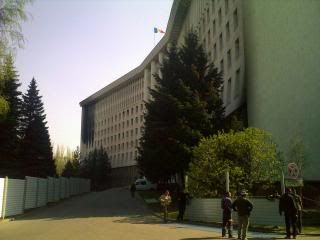
The burnt parliament building
The recent riots in Moldova have been largely forgotten by the media, if they were ever reported in the first place. While a voting scandal of this magnitude and the subsequent burning of a national parliament building in any Western European country would have been headline news around the world, Eastern European countries - and little Moldova in particular - are largely ignored.
This is very unfortunate, as stability in Eastern Europe is essential towards realizing stability for all of Europe and normalizing relations between Europe and Russia. Sadly, from what I saw when I visited Moldova at Easter, the degree of corruption perpetrated by Moldova's governing communist party has entrenched the country in a legacy of poverty, depression, and hopelessness that will affect Moldova for years to come.
The mood in Chisinau, only two weeks after the demonstrations, was one of dour depression. Everyone seems to have given up hope. As my friend Corina put it, "We're tired of fighting anymore." many of the discos were closed or empty, and talk of leaving the country was on everyone's lips.
Why this feeling of hopelessness?
Allow me to recount the events of the demonstrations, including the details provided by the people I talked with. Several weeks ago, Moldova had parliamentary elections. In previous elections, the communist party had often won most of the votes. One reason cited for this has to do with the elderly. Older voters remember how, during the days of the USSR, they were guaranteed a monthly income. These days, now that capitalism reigns, the elderly are given small stipends (often about $60 a month) by the communist party. While this is not enough to live on, it is still a system of making an income that the elderly are familiar with. thus, they vote for the communists out of a sense of security and nostalgia.
Unfortunately, despite giving the elderly pocket money, the communist party has done nothing else good for Moldova. The president of Moldova, Vernon - a former KGB member - is a renowned crime boss whose son has stolen a number of successful Moldovan companies by planting false criminal evidence in their homes and making them flee the country. Additionally, the Molovan government under communist rule has a record of stealing funds given to the country by various NGO's, the members pocketing this money for their own ends. Essentially, the communists a re nothing more than a gang of criminals who use Moldova to further their own greed.
The Moldovan people have long known this. Indeed, government in Moldova has never been very efficient, not since its liberation from the USSR. However, at this last election, people hoped for a change. the recently elected mayor of the capital, Chisinau, is not communist, and many people thought that the rest of the country would also turn away from the communists as well. People hoped that the elections would at least give them a voice calling out for change.
Unfortunately, the communist government stifled this voice.
The accounts of voting fraud committed by the communist party are legion. Thousands of dead voters apparently rose from their graves to vote communist. People living abroad in Italy and Romania (many of whom left to work abroad because the communist party has made life in Moldova so difficult) apparently all voted communist on their absentee ballots. Communists even came into hospitals for the mentally ill and made them stamp "communist" on the voting forms. The acts of fraud are so flagrant, clearly the communists did not try to hide the fact that they had stolen the election. They just didn't care that anyone knew. They just wanted power, by any means necessary. As a result, the communists won over 60% of the vote, enough to allow them to rewrite the constitution.
Although Moldovans traditionally value peace and often do not stage demonstrations when confronted by political corruption (a tenancy the communists were probably banking on) this year the Moldovans decided to protest. Thanks to Flickr and Facebook, a call went out amongst the young and angry to rise up and protest. Thousands of Moldovan youth heeded the call and demonstrated against the communists before the parliament building.
Unfortunately, the communists were ready for them. As media interviews and various blog entries have proved (like this: http://savemoldova.blogspot.com/2009/04/comunist-conspiracy.html) the police hired people to act as instigators of violence. The instigators embedded themselves into the ranks of protesters and became violent, throwing rocks at the parliament building (placed there, some have said, by the police as well) and then looting and burning the building as well. many of the younger, more excitable members of the crowd joined the instigators and began attacking the parliament building as well. After all, when one sees others acting with justified outrage and violence, it is hard not to get caught up in the passions of the moment.
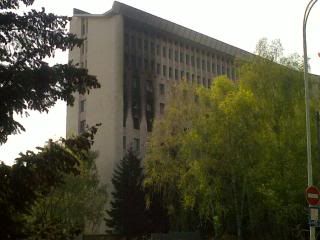
Another view of the Moldovan Parliament
Unfortunately, the police had laid their trap well. As soon as the violence started, the police swooped, arresting people indiscriminately - those who were engaged in the looting and those who were just standing in the crowd as well. Even in following days, using photographic evidence, the police came barging into university classrooms to arrest those who had been at the demonstrations. People were tried and sentenced without lawyers present, and several were killed during the interrogation process. Even while I was there, some parents still had no idea where there children were or if they were still alive. There were, of course, subsequent plans for demonstrations. One was attended by older Moldovans to show their solidarity with the young and disprove the communist's notion that the riots were merely acts of teenage rebellion and not to be taken seriously. But, as people were still afraid of the instigators, many did not show up to the demonstrations and the protests ended. The streets swarm with police, and - though everyone says "Down with the communists!" in private, few dare to make these feelings public. No one else wants to be arrested, tortured, or killed.
Not surprisingly, none of the instigators (who can be seen on the front lines in photographs taken of the event) were ever arrested, despite how many non-violent protesters were.
Of course, despite the facts, the communists have made up their own story. They claim that it was Romanian spies who hired the instigators. As a result, Moldova dismissed the Romanian ambassador and closed off diplomatic ties with Romania. As the communists have largely been bedfellows of Putin's Russia, despite the fact tat the majority of Moldovans are ethnically Romanian, this was clearly a maneuver to ally Moldova more strongly with Russia. However, Romania retaliated as well. Romania announced that it would grant a Romanian passport to anyone whose grandparents or great-grandparents had been Romanian (which would include anyone whose family had been in Moldova while it was part of Romania in the period of Moldova's independence from Russia in the early part of the 20th century)and that the passport could be processed in mere weeks.
Not surprisingly, many people I talked to while in Moldova either planned or entertained the idea of getting a Romanian passport and leaving the country. It's not that they do not like their country, but after a lifetime spent putting up with a corrupt government and the consequent poverty and lawlessness in the country, most people have just had enough. They are ready for a better life, and are convinced that they will not have it as long as they stay in Moldova. Sadly, they are probably right.
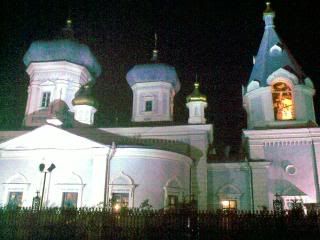
An orthodox church on Easter
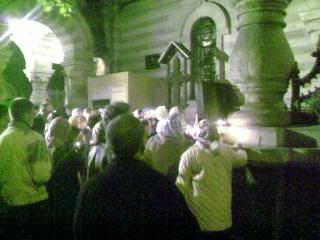
People standing before the church on the night of Easter
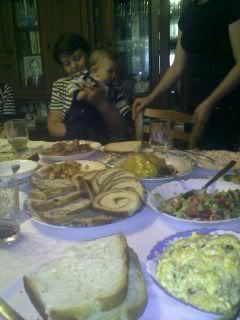
Enjoying a delicious Easter meal
So, my time in Moldova was bittersweet. I saw great friends and had fun nights dancing at the discos and drinking good Moldovan wine and cognac. The weather, too, was fantastic. Springtime, and Easter especially, is traditionally a particularly pleasant time in Moldova. The trees and hills in the countryside are adorned with flowers and blossoming trees, and everyone is excited by the promise of warmer weather ahead. Easter, too, is a special occasion, where people go to church all night, stand and listen to a sermon, and in the morning the priest comes around and blesses the baskets of food the people have brought with them with sprinkled holy water. Afterwards, the people take the blessed food home and have a huge family feast. It should be a happy, familial, and joyous occasion.
Sadly, this Easter, joy was in short supply in Moldova.
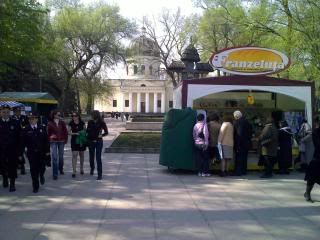
On the right, selling Easter Bread for the holiday. On the left, evidence of the new swarms of police everywhere in the city.

0 Comments:
Post a Comment
<< Home